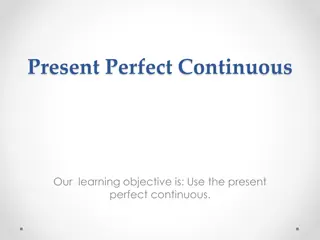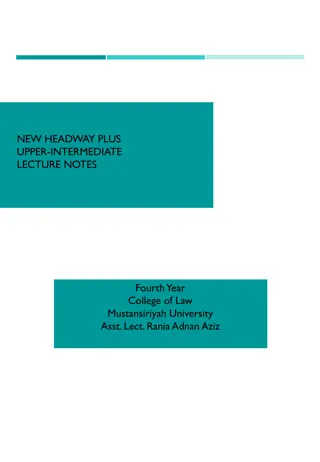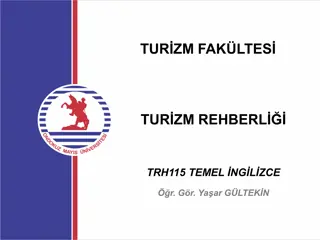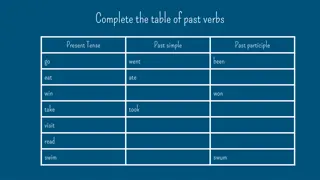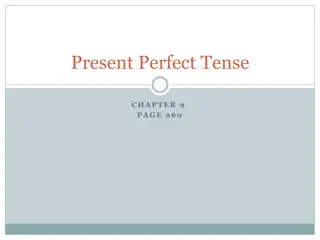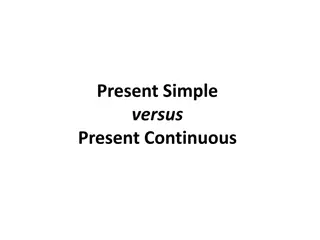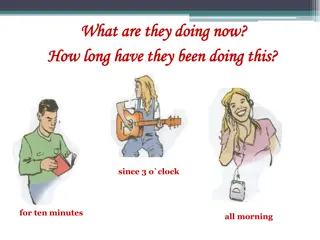Homeworking: The Shift to Remote Work and Present Perfect Continuous Tense
Ahmed Ali, an IT specialist, shares his experience of working from home during the Corona pandemic. He discusses the pros and cons of homeworking, including the challenges of balancing work and family life. The lesson also covers the usage of the present perfect continuous tense to describe ongoing actions or results of past actions.
Download Presentation

Please find below an Image/Link to download the presentation.
The content on the website is provided AS IS for your information and personal use only. It may not be sold, licensed, or shared on other websites without obtaining consent from the author.If you encounter any issues during the download, it is possible that the publisher has removed the file from their server.
You are allowed to download the files provided on this website for personal or commercial use, subject to the condition that they are used lawfully. All files are the property of their respective owners.
The content on the website is provided AS IS for your information and personal use only. It may not be sold, licensed, or shared on other websites without obtaining consent from the author.
E N D
Presentation Transcript
Eng.201 New Language Leader 2 Grade 11 First Semester Unit 3 WORK Lesson 3.2 HOMEWORKING
ENG ENG201 201 unit unit 3 3 Work. L. Work. L.3.2 3.2 Homeworking Homeworking Objectives By the end of the lesson, you will be able to: extract specific information from a reading text, and identify and use of the present perfect continuous.
10 min Read the article then answer the questions. Homeworking Ahmed Ali is an IT specialist at a well-known publishing company. He has lived in Dubai since 2010, and for the last four months he has been working from home because of the Corona pandemic. He started working from home when the country announced remote working as one of the precautions to control the Coronavirus Pandemic. However this is not new. Before the Pandemic, some people had already worked from home. At first, it was difficult for Ahmed to work from home but now he is used to it. He prefers now to work from home as he can spend more time with his family and feels more relaxed. Working from home, according to a study by the International Labour Organisation , The expansion of teleworking is likely to further accelerate in the years to come. In recent years, a large number of companies have been offering employees more flexible ways of working. Working from home brings many benefits to employers and employees. Office space is costly, so if a company can reduce its workstations, it may be able to move to a smaller site and for some people the office provides a break from the family. However there are disadvantages, it is not suitable for people living in a crowded space or with young children and so can t separate their work and family space. Homeworking has its pros and cons. Some people prefer working in the office to at home as they like to interact with people and to have a break from their family. On the other hand, there are others, like Ahmed, who live with their family but still have the time management skills to work well on their own. 1. What does Ahmed do? 2. Why has he been working from home? 3. Why does he prefer to work from home now? 4. What are the pros and cons of homeworking? ENG ENG201 201 unit unit 3 3. L. . L.3.2 3.2 Homeworking Homeworking
Present Perfect Continuous When do we use this tense? We use the present perfect continuous talk about an action in progress that started in the past but is still happening. We have been waiting for the bus for twenty minutes. action in progress What is the form? He/she/it + has + been + v + ing present She has been teaching for 20 years. continuous perfect They/you/I + have + been + v + ing They have been playing for two hours. ENG ENG201 201 unit unit 3 3. L. . L.3.2 3.2 Homeworking Homeworking
Present Perfect Continuous 2. To talk about an action that has finished, but you can still see the result. . I am tired! I have been exercising for long hours. action has finished result . She is exhausted! She has been studying for late hours. action has finished result ENG ENG201 201 unit unit 3 3. L. . L.3.2 3.2 Homeworking Homeworking
5 min Put the verbs between parentheses into the Present Perfect Continuous to complete the sentences. 1. Your room is in a mess! have been working Sorry mum I -------------------------------- (work) on my project . have been dancing 2. They -------------------------------- (dance) for long hours. has been raining 3. The ground is wet. It -------------------------------- (rain) the whole day. 4. Look, you hurt yourself! have been cutting I -------------------------------- (cut) tomatoes. Has been living 5. He -------------------------------- (live) in London for 10 years. ENG ENG201 201 unit unit 3 3. L. . L.3.2 3.2 Homeworking Homeworking
5 min Write your own sentences using the present perfect continuous. 1. We have been learning English for ten years. 2. My clothes are dirty. I have been cleaning the house. POSSIBLE ANSWERS 3. She has been running for long hours. 4 Look! Your car is damaged! I have been racing today. 5. He has been living with his brother since 2018 . ENG ENG201 201 unit unit 3 3. L. . L.3.2 3.2 Homeworking Homeworking
End of the lesson Thank you for your perseverance and hard work ENG ENG201 201 unit unit 3 3. L. . L.3.2 3.2 Homeworking Homeworking







